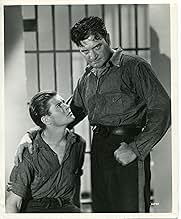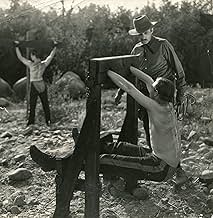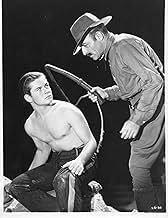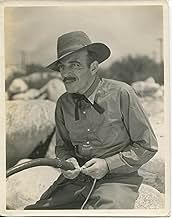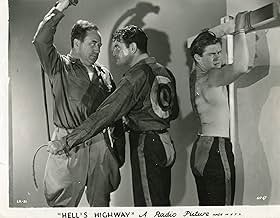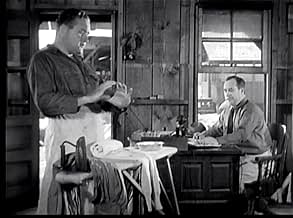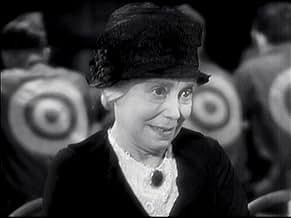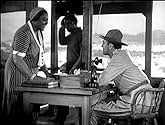अपनी भाषा में प्लॉट जोड़ेंChain gang prisoners forced to construct a "liberty highway" for their overseer chasten under his brutal stewardship, causing Duke Ellis to mastermind a mass riot.Chain gang prisoners forced to construct a "liberty highway" for their overseer chasten under his brutal stewardship, causing Duke Ellis to mastermind a mass riot.Chain gang prisoners forced to construct a "liberty highway" for their overseer chasten under his brutal stewardship, causing Duke Ellis to mastermind a mass riot.
- निर्देशक
- लेखक
- स्टार
- पुरस्कार
- कुल 1 जीत
- Rascal's Sweetheart at Visitor's Center
- (बिना क्रेडिट के)
- Hunt Club Manager on Telephone
- (बिना क्रेडिट के)
- Singer in Etude Ethiopian Chorus
- (बिना क्रेडिट के)
- Singers of the Spirituals
- (बिना क्रेडिट के)
- Turkey Neck Burgess - the Cook
- (बिना क्रेडिट के)
फ़ीचर्ड समीक्षाएं
- The headlines in the opening sequence are from real newspapers, and refer to the Arthur Maillefert case which shocked the nation. On June 3, 1932, Maillefert was put in a shed similar to the one we see in the movie, with a chain wrapped around his neck and wooden stocks around his feet, and he died within an hour. The first article shown is from the Seattle Post-Intelligencer, "Prison Guards Accused of Murder As Tortured Youth Dies Chained In Sweat Box", and if you search for the next one, "Dark Age Tortures Revealed in Prison Camp Death Quiz", you'll see it's on the front page of the San Francisco Examiner from July 10, 1932. Filmmakers moved quickly; this movie was released September 23, 1932.
- The moment when a guard is about to whip the main character (Richard Dix), but hesitates. The camera pans down and we see a large tattoo on his back with the American flag, and the words "42nd Machine Gun Co. 167th Inf." We don't know much else about this guy and the film doesn't describe too much about his crimes, except that they're numerous and he's "habitual", destined for a life sentence - but finding out that he's a veteran humanizes him, and also points out that criminals have also done positive things in their lives. Given the horrifying outcome of the 'Bonus Army' encampment in Washington D.C. in July, 1932, this image would likely have resonated even more with filmgoers at the time.
- During the jail break the deaf prisoner is hiding in the tall grass, and doesn't see a couple of guys come up behind him. They tell him to "put 'em up", and of course he doesn't because he can't hear them, so they shoot him. It's another case of not knowing everything about someone else, and either misinterpreting or not understanding their actions as a result.
- I loved the treatment of African-American in the film. One wisely comments that the guards are more concerned with the way mules are treated than convicts, because mules cost money and the men are free. Another says to his visiting wife that "Sweetheart, you don't how tired a man does get when he don't get no loving," which in a simple way helps us empathize. I also loved the scenes where we hear groups singing the blues, and during one of them, an artist drawing a few funeral scenes.
- Lastly, something about seeing C. Henry Gordon trying to learn the violin at night using the "E-Z Method" made me smile; perhaps despite his inhumane ways, the film tries to point out he's human too.
I was less enamored with a few comments about women, one of which being that a lot of crime is done on behalf of women, and another that prison is a good way to escape being married to three women, since, you know, women are such balls and chains themselves. "I Am a Fugitive from a Chain Gang", also from 1932, is a better film with more emotional power, but this one is worth seeing too.
The film stars Richard Dix in an unusual role. He plays perhaps the toughest of all these prisoners--a guy respected yet feared by everyone. Only when his young brother is also committed to this same chain gang is Dix's toughness challenged. Amidst this strange family reunion is the purpose of this chain gang--not to rehabilitate but to provide cheap labor for a jerk trying to produce a road and make himself rich in the process.
The film excels due to pretty good acting and an exciting script. While it's not as timeless and important as "I Am a Fugitive...", it is, nonetheless, well worth seeing and might surprise you at the film's quality and strength.
sign language gibberish
Catch those rolling cages the convicts are kept in. They'd even be sub-standard for wild animals in a circus. But then, this is a down and dirty look at a chain-gang work crew, circa 1932, where shooting a con is made easier by the bull's eye on their backs. And if a con misbehaves, like not working fast enough to make the road contractor more money, it's a time in the sweat box, which is like doing time in an upright coffin-- you walk in, they carry you out. Now all this might sound like a lefty screenwriter's fevered dream, but the prologue assures us that the abuses are based on fact.
Then too, the cons are toiling in the middle of one ugly nowhere, and when the place catches fire, it's big enough to take down Chicago. No wonder the cons are looking to escape, and being a prison movie, they do. In my book, the best scene is the luckless deaf guy who never hears the bullet coming. I hope his last minute mumbo-jumbo was enough to get him past the pearly gates—it's a moving and inspired moment.
Then too, Dix makes a convincing boss con, as does C. Henry Gordon as the brutal boss muleskinner. But my money's on the cadaverous Charles Middleton (the hermit) who's on prison vacation from three wives and apparently dabbles in the black arts as when he foresees doom in the stars. His graveyard voice and grim reaper demeanor are like no other and can chill you to the proverbial bone.
Of course, being a Rowland Brown directed film, there are passing references to homo-erotic behavior, (see especially his Blood Money {1933}). All in all, he manages to blend the diverse story elements, including the black men's chorus, into a forcefully memorable whole. Too bad his directing career was so brief. He was that rarest bird in old Hollywood—a genuinely independent spirit.
It's a bang-up 60-minutes from struggling little RKO that takes no prisoners, so to speak. More importantly, there's something topical about tax-supported labor being used to enrich private contractors, as in the movie. Too bad, this over-looked little gem was assigned to pre-Code oblivion.
क्या आपको पता है
- ट्रिवियाRKO executives were concerned about a possible plagiarism suit by the author of the book and the movie version I Am a Fugitive from a Chain Gang (1932) in production at Warner Bros. at the time. Some deletions and changes were made until they were satisfied that no legal action would be taken.
- भाव
Duke Ellis: [Chatting with a convicted bigamist] How many women did you really marry?
Matthew the Hermit: How many banks did you really rob?
Duke Ellis: Never more than one at the same time.
Matthew the Hermit: It takes nerves of steel to rob a bank.
Duke Ellis: It takes a lot of backbone to keep three wives happy.
Matthew the Hermit: Yea, Brother!
टॉप पसंद
- How long is Hell's Highway?Alexa द्वारा संचालित
विवरण
- चलने की अवधि
- 1 घं 2 मि(62 min)
- रंग
- पक्ष अनुपात
- 1.37 : 1

